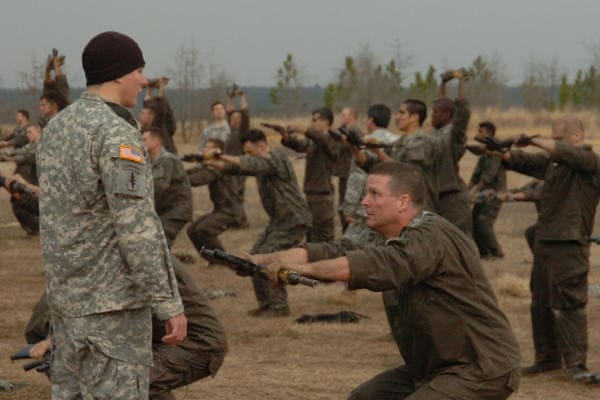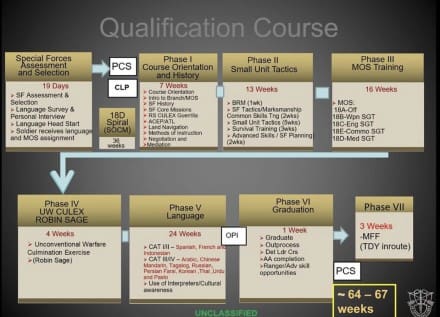
Although it has been reengineered many times over the past 60 years, the Army’s Special Forces Qualification Course, four components have remained constant. Some form of selection, whether pre-phase, SFOT or SFAS along with individual tactical skills, MOS specific training and collective team training culminating in an FTX, commonly referred to as “Robin Sage”. This is the current version of the Q Course.



Impressive is an understatement.
How do they retain their language skill? It is a perishable skill, do they have times where they use it exclusively with others who have the same language?
The language training is continuous throughout the career of an SF soldier. Those of us who didn’t already speak a second language that met the requirements of our unit would take part in DLI training during the Q Course and take a proficiency examination to ensure we met minimum standards. However, one must retake this test every six months throughout one’s career. A higher score meant a higher additional skill pay up to $400/month. One could also qualify in more than one “target language” and the pay would increase. Also, deployments served to improve real proficiency as one would be expected to actually teach and operate with our foreign partners in their own language. There are also a few additional training opportunities available throughout the year, provided one is not committed to a deployment and can therefore participate. An example of such an additional training opportunity is called “immersion”. During a language immersion training opportunity, several SF soldiers would be funded to travel abroad to study their target language for one or two months. While there, their place of duty would be the university running the program and they would report to the US Embassy’s Office of Defense Cooperation (ODC) for accountability during their time in-country.
“Impressive” is an understatement. The language acquisition component fascinates me. How do they maintain their language after training? Do they use it regularly, “drilling” with it as they do their other skills to maintain it?
Many don’t. We tend to send them to places with languages that aren’t the easiest to digest in a brief period. Good news is the beat way to learn a language is to be immersed in it so as long as they receive a good foundation, a year in country will fill in the rest.
I’ve wondered about the language part too. I’ve never spent any appreciable time with green berets much less heard them speak a foreign language so the first question is: what passes for proficiency? I don’t think I’m alone in believing that you’re not going to maintain anything approaching fluency (whatever that means) unless you’re speaking the language daily.
Depends on the language.
All,
Gaining and maintaining diverse language skills has always been a significant challenge for SF and other American soldiers (Intel, Interrogators, etc.). I will just add a couple of additional issues that are habitually encountered operationally.
First, and most importantly, an SF soldier has to be able to work effectively through interpreters. Even if he is fluent in a specific target language, chances are his counterparts will speak local dialects that he won’t know. For example, we teach Tagalog for the Philippines. That is the dominant language / dialect on the northern islands, but not in the southern islands. So, if working in the south an interpreter in the local dialect is a necessity.
When I was in Senegal (West Africa) with 3rd Group, we had to work thru three different interpreters. The educated Senegalese officers spoke French. We had that covered. However, the soldiers spoke multiple local tribal dialects. Even their own officers had to use translators for the dialects they did not know.
When I had deployed to Ethiopia with 5th Group, none of the local languages were on the SWCS target list. However, many of the Ethiopian officers had been trained in the Soviet Union during the Cold War and spoke Russian. Luckily, one of my guys had taken Russian in college and that helped bridge the gap.
There is also a great deal of difference between proficiency in conversational language and technical language skills. Being able to banter – even fluently – does not mean that one automatically has the specialized language tools to teach MDMP or other complex military concepts.
Luckily, many physical skills – small unit tactics for example – can be effectively taught by demonstration and imitation and don’t require extensive spoken language skills.
TLB
Proficiency required for graduating from the Defense Language institute (DLI) is a 2/2/1+ (Reading/writing/speaking) on the DLPT. That is the standard for all languages to graduate. But there are waivers for everything. Green berets go through the training like everyone else, I had one in my class time there.
After graduating it depends on the job for required “proficiency”. For Intel a 2/2 is the minimum with the expectation to improve to 3/3 fairly quickly. For others, they may not have to test again. Iirc, from hearing others SF peeps talk in my time there, if they don’t meet the minimum, they just don’t get the Flip pay. But that was 10 years ago now, so who knows.
With respect: your information is incorrect.
DLI is not part of the SF pipeline, SF attends language school at USAJFKSWCS in Bragg, the standard for graduation is 1/1/1. DLI is an option available later in the career of any 18 series Soldier.
Once in Group a SF Soldier must maintain a 1/1/1 or they will be kept from attending schools and possibly being promoted, attendance of schools without a 1/1/1 is waivable on the Group level (as of 2016).
Specific SF MOSCs do not have specific language skill requirements, that is patently false, even as of 10 years ago, and unless it’s changed in the last 3 years, it’s still incorrect.
Scoring below a 2/2 exempts someone from receiving FLPP (Foreign Language Proficiency Pay), that’s not SF policy, that is Army Regulation. However, there are further consequences for not making a 1/1/1 as stated prior.
Replying to the OP: language skill maintenance is (supposed to be) done on a 12-18 month basis, this standard is upheld for the most part. Every post-combat deployment I was put into CLP (Command Language Program) where part of the recovery cycle was a specified number of hours of language courses, this does not always happen, but in the “ideal” world it’s supposed to, at least in 1st SFG(A). Also there are immersion programs available through Group Language Labs, 1st Group had the best supported one as of my retirement date, we sent people to numerous countries to attend language course in their target language countries.
How do I know this? I attended BMLC (Basic Military Language Course) in Bragg after the Q-Course, DLI after my first three years of team time, CLP after OIF in 07, OEF in 13, and before a JCET in 12. I retired out of SWEG (Special Warfare Education Group) in Bragg which runs the current language school that’s part of the pipeline of the Q-Course. During my career after DLI I maintained at least a 2/2 in my target language. I’m speaking from first hand experience.
The main motivator for the majority of SF Soldiers to maintain a 1/1 is schools, to maintain a 2/2 or more is money. An extra $2400-$4000 a year tax free makes a lot difference for any enlisted Soldier.
DOL
TFB and others hit the nail on the head with their comments.
Anecdotally, there are many SF/SF-enablers which are assigned/deployed to regions unrelated to their language training, as in Korean-trained in a Pashto region. As others have stated, there are refresher courses and JSOU has improved over the years.
Observationally, google “The Impact of FLPB Policy Changes on US Army Special
Forces Soldiers Testing and Proficiency”. This was a study that analyzed various policy changes to the ARSOF language program, i.e. FLPB, OPI, and the results thereof.
As far as language goes they have to pass a test each year and get a passing score. There are different levels of passing. The higher the lever the higher you get for language pay. The language school they go through in the Q course they go back to during their career. It’s more like a refresher. You go for as long as you have to to pass your test. While in country they use the language but always have translators with them.
The closest thing posted so far was from JP and even that explanation is outdated, as it no longer functions that way. The answer to the question is that all the Groups have a language lab and or online courses where they can meet with a real flesh and blood language teacher or do the online learning modules, like Rosetta Stone. Of course, deployments and long hair dictionaries go a long way in enabling and maintaining ones language proficiency.
As to the main topic of the piece, The Q course’s ongoing evolution has and is still a heated debate in how and what is covered given the propensity for the lowering of standards in order to make number “quotas”, and or be “more inclusive” (see Ranger school standards and females for reference).
Good post. It’s always humbling to go OOC and find locals who have retrained in languages when we couldn’t. A sign of something I believe hugely deficient in our ability to function worldwide.
Language is the poor mans NV.
Bros! My ATL told me about this, that SF mostly door crashing ops but also language school! Those boys like to rock different languages hitting doors hard so the bad guys got zero idea of what comes next! Someone says “breacher up let’s stack” in Italian, nobody knows! BAD A$$ BROTHERS!